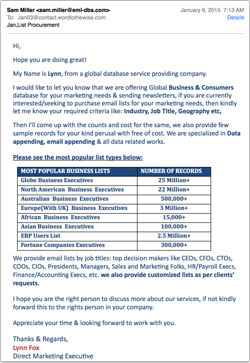Can we put the FREE!!! Myth to bed?
- laura
- June 1, 2016
- Best practices
Really. Single words in the subject line don’t hurt your delivery, despite many, many, many blog posts out there saying they do. Filters just don’t work that way. They maybe, sorta, kinda used to, but we’ve gotten way past that now.
In fact, I can prove it. Recently I received an email from Blizzard. The subject line:
Laura — Last Chance to Claim Your FREE Copy of Warlords of Draenor — Including Level 90 Boost! Offer Expires Monday! Last Chance to Claim Your FREE Copy of Warlords of Draenor — Including Level 90 Boost! Offer Ends Monday!
We have an email with
… two instances of FREE in all caps
… 4 different exclamation points
… Offer Expires
… Last Chance
… Unsubscribe
all right there in the subject line.
And what does Spamassassin say about the mail?
X-Spam-Flag: NO
X-Spam-Status: No, score=-7.193 tagged_above=-999
required=6.31 tests=[BAYES_00=-1.9, DKIM_SIGNED=0.1,
DKIM_VALID=-0.1, DKIM_VALID_AU=-0.1,
HTML_IMAGE_RATIO_04=0.556, HTML_MESSAGE=0.001,
RCVD_IN_DNSWL_MED=-2.3, RCVD_IN_MSPIKE_H3=-0.01,
RCVD_IN_MSPIKE_WL=-0.01, RCVD_IN_RP_SAFE=-2,
RP_MATCHES_RCVD=-1.428, SPF_HELO_PASS=-0.001,
SPF_PASS=-0.001] autolearn=ham
autolearn_force=noSee that first line? X-Spam-Flag: NO
See the next line: score=-7.193. Notice the negative? That’s almost 14 points less than what is needed for our installation of SpamAssassin to mark a message as spam.
Words in the subject line are not used for filtering in any sane filter.
Exclamation marks don’t trigger filters.
FREE does not trigger filters.
It’s time to retire the myth that spam filters pay any special attention to the subject line. They don’t. In fact, to a mail server the Subject line is just another bit of content. One that is only special because it starts with a defined field name (Subject), has a colon and contains a line terminated by CRLF. In fact, a subject line isn’t required for an email.
The only required header fields are the origination date field and the originator address field(s). All other header fields are syntactically optional. More information is contained in the table following this definition. Section 3.6, RFC5322
Section 3.6, RFC5322
Filters don’t treat the subject line any differently than the rest of the email content.
(For the Horde.)

